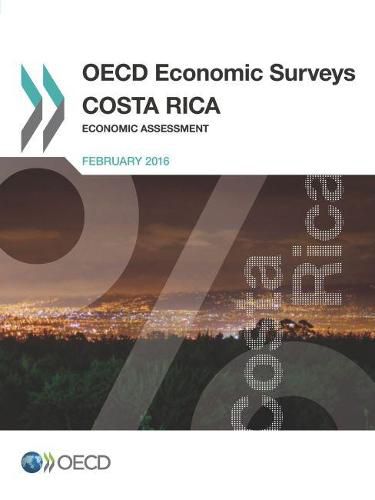Readings Newsletter
Become a Readings Member to make your shopping experience even easier.
Sign in or sign up for free!
You’re not far away from qualifying for FREE standard shipping within Australia
You’ve qualified for FREE standard shipping within Australia
The cart is loading…






Costa Rica succeeds in combining rising living standards with sustainable use of natural resources. Incomes per capita have nearly doubled in real terms over the past three decades. Almost universal access to health care, education and pensions has been achieved. Careful management of natural resources has emphasised the protection of forest and the development of renewable energy sources, providing foundations for the strong ecotourism industry. As a result, the well-being of most Costa Ricans is high, as attested by long life expectancy, poverty rates low by Latin American standards and above-average perceptions of life satisfaction. The public deficit and debt have risen since the start of the 2009 global crisis. Rating agencies have downgraded Costa Rica’s debt to below-investment grade and its country risk spread has risen. To restore the fiscal balance it is urgent to raise more tax revenue and curb spending, notably the fast increasing public-sector wage bill. Improving the fiscal framework by enhancing its transparency and predictability, and reinforcing central government control over public finances would strengthen public-finance management. Despite strong performance, socioeconomic challenges remain. Policy reforms and institutional changes could put Costa Rica on a path of stronger and more inclusive growth. The main priority is to improve the framework of competition policy and state-owned enterprises’ governance. Productivity would be enhanced by promoting innovation, access to finance and transport infrastructure. Such reforms need to go hand in hand with making Costa Rica a more inclusive society, especially for women, by improving the quality of education andenhancing the effectiveness of cash transfers in reducing poverty, thus expanding opportunities and sharing prosperity more widely.
$9.00 standard shipping within Australia
FREE standard shipping within Australia for orders over $100.00
Express & International shipping calculated at checkout
Costa Rica succeeds in combining rising living standards with sustainable use of natural resources. Incomes per capita have nearly doubled in real terms over the past three decades. Almost universal access to health care, education and pensions has been achieved. Careful management of natural resources has emphasised the protection of forest and the development of renewable energy sources, providing foundations for the strong ecotourism industry. As a result, the well-being of most Costa Ricans is high, as attested by long life expectancy, poverty rates low by Latin American standards and above-average perceptions of life satisfaction. The public deficit and debt have risen since the start of the 2009 global crisis. Rating agencies have downgraded Costa Rica’s debt to below-investment grade and its country risk spread has risen. To restore the fiscal balance it is urgent to raise more tax revenue and curb spending, notably the fast increasing public-sector wage bill. Improving the fiscal framework by enhancing its transparency and predictability, and reinforcing central government control over public finances would strengthen public-finance management. Despite strong performance, socioeconomic challenges remain. Policy reforms and institutional changes could put Costa Rica on a path of stronger and more inclusive growth. The main priority is to improve the framework of competition policy and state-owned enterprises’ governance. Productivity would be enhanced by promoting innovation, access to finance and transport infrastructure. Such reforms need to go hand in hand with making Costa Rica a more inclusive society, especially for women, by improving the quality of education andenhancing the effectiveness of cash transfers in reducing poverty, thus expanding opportunities and sharing prosperity more widely.